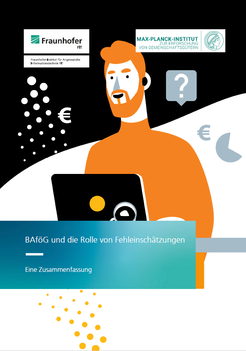New study: Why students do not apply for BAföG (German student aid) despite being eligible – and how information can help
Although more and more students are formally eligible for BAföG, take-up remains low. A joint study by the Max Planck Institute for Research on Collective Goods and the Fraunhofer Institute for Applied Information Technology FIT has identified the main reasons: Misperceptions about their own eligibility, the funding conditions and the repayment terms prevent many students from even applying.

According to a nationwide survey of more than 22,000 students, up to 70 percent of those eligible do not apply for BAföG. The main reason: 82 percent of those affected underestimate their chances and mistakenly believe that they are not eligible – often due to misperceptions about the parental income thresholds. And even among those who are aware of their eligibility, many decide not to apply due to excessive fears about repayment.
‘Our studies clearly show that it is not a lack of need that deters students from applying for BAföG – it is a lack of knowledge,’ emphasises co-author of the study Dr Sebastian Riedmiller from the Max Planck Institute for Research on Collective Goods. ‘Misperceptions about parental income or repayment obligations are widespread. However, these information gaps can be closed in a targeted manner – and this is exactly where we come in.’
A field experiment involving over 6,200 students shows that simple, clearly formulated information interventions can significantly reduce misperceptions – and increase the likelihood of applications by 46 percent. Students from financially disadvantaged households benefit particularly.
To make these effects digitally and scalably usable, an AI-supported BAföG chatbot was developed at the Fraunhofer Institute for Applied Information Technology FIT. It provides individual information on eligibility for funding and calculates precise BAföG amounts based on a few details – comprehensively, quickly and anonymously.
Co-author Sascha Strobl from Fraunhofer FIT explains: ‘The chatbot offers a low-threshold, personalised alternative to traditional counselling. Our goal is to establish it across all universities and student services so that no one is left without financial support.’
A scientific evaluation of the chatbot is currently underway. It aims to show whether AI-based counselling outperforms traditional information formats in terms of effectiveness and comprehensibility. In the future, it is conceivable that the chatbot could be integrated into the application process or expanded to include functions such as document verification. The test version of the BAföG chatbot is available here: https://s.fhg.de/bafoeg-chatbot
The complete study ‘BAföG und die Rolle von Fehleinschätzungen’ is available for free download here.
More coverage:
